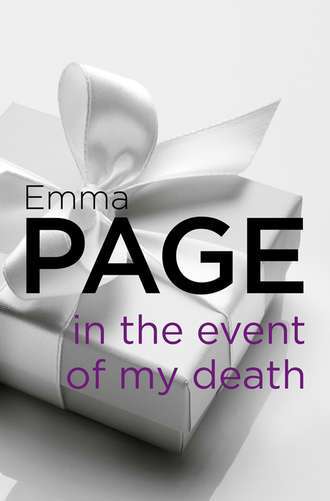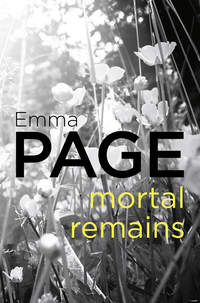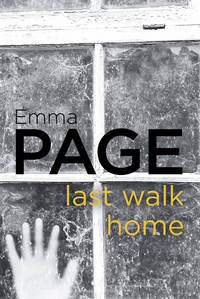
Полная версия
In the Event of My Death
And he was up betimes next morning. In the supermarket he loaded his trolley with his old reliable standbys: cans of soup, spaghetti, baked beans, corned beef, ravioli, meatballs, stews. Anything that could be ready to eat in five minutes flat from the moment of putting his key into the front door, or even, in extreme fatigue, consumed cold, with a spoon, straight from the can. He had given up laying in a fancy assortment of frozen dishes. In hunger and exhaustion it was only too easy to make mistakes with a microwave, but, half dead or not, he always knew where he was with a can-opener.
Last of all, he added to his trolley a vast supply of that most essential of commodities: indigestion tablets.
He went through the check-out, stowed his purchases in the boot of his car and returned his trolley to its rightful place. As he was walking back to his car again, he spotted the Elmhurst station wagon turning into the car park, with Gosling at the wheel. Beside him, Dorothy Nevett sat staring out with a look of anxiety, as if lost in her own thoughts. Kelsey had known them both since the day he had first walked in through the Elmhurst gates as a boy of eight, a cadet in a church lads’ brigade, looking for any odd job within his powers, to earn a few shillings to swell the brigade funds.
He walked across to where Gosling was pulling up. They both caught sight of him as he approached, they looked pleased to see him. After some initial chat, he inquired after Mrs Dalton. Busy as he was these days, he called to see Grace at least once or twice a year. If anything to do with Elmhurst cropped up in the line of duty, he made a point of dealing with it himself. In Grace’s more active days, he had regularly come across her when she had served as a magistrate.
Dorothy told him about the birthday celebrations in two weeks’ time. ‘I’d like to call in to offer my good wishes,’ Kelsey said. ‘I’ll look in a day or two before. I’ll give you a ring first, to check it’s OK.’
‘And be sure to call in to see my father-in-law, while you’re about it,’ Gosling chipped in. ‘Nothing the old man would like better than a chat with you.’ Kelsey told him he wouldn’t forget.
‘How’s Jean Redfern these days?’ he went on to ask. He had been a young constable when Jean was born; he had seen her grow up. ‘I take it she’s still at Elmhurst?’
Dorothy gave a vigorous nod. ‘She certainly is.’ She slanted at the Chief a glance full of meaning. ‘That good for nothing boyfriend of hers is back. Shaun Chapman. I’ve seen him round the town. You remember the fuss there was a few years back, when Jean wanted to marry him.’
Indeed, the Chief did remember. Mrs Dalton had asked him to look into the lad’s background. He hadn’t come up with anything very terrible – or particularly reassuring. The Chapmans lived on a Cannonbridge council estate; Shaun was the eldest of several children. The father had never been in trouble with the law but neither could he be described as a pillar of society. He was fond of a drink, never held a job down for long. His wife did occasional cleaning.
‘I’m positive Jean’s seeing him again,’ Dorothy averred with conviction, ‘though she swears she isn’t. She’s going out more in the evenings, all dolled up. She says it’s with girlfriends, but I’ll lay good money it’s not.’
‘Does Mrs Dalton know she’s seeing Shaun?’ Kelsey asked.
She shook her head. ‘I haven’t said anything yet, I don’t want to worry her. But I may have to say something if it goes on, she’s got a right to know.’
Kelsey changed the subject. ‘How’s your friend Alice?’ he asked with a smile. Once, in his early days at Elmhurst, when Dorothy was a young woman, he’d been sent up to her room with a message and he’d noticed Alice’s photograph, prominently displayed. ‘That’s my friend, Alice Upjohn,’ Dorothy had informed him in a tone of possessive affection. She had shown him other photographs, she had told him about her friendship with Alice, going right back to infancy. From time to time after that he would inquire after Alice and Dorothy would reply with a fond smile, giving him the latest tit-bit of information, showing him the latest snapshots.
Today, however, Dorothy gave him no answering smile, supplied no tit-bit of news but merely replied: ‘She’s very well, thank you,’ and left it at that.
Not content with his supermarket foray, Chief Inspector Kelsey spent part of Saturday afternoon shopping for more personal items in a department store in the centre of Cannonbridge. He left the store just before five-thirty, bound for the car park.
As he made his way along the crowded pavement, a bus pulled up a little way ahead. He saw Jean Redfern jump off the bus into the arms of a young man waiting at the stop. The Chief was briefly halted by the press of folk. The pair turned his way and came past him, arms round each other’s waists, laughing, chatting; they didn’t see him.
Jean looked flushed and pretty. The young man was tall and loose-limbed, undeniably good-looking. Three years older than when the Chief had last set eyes on him, but there could be no mistaking his identity: Shaun Chapman.
On Monday evening, as time drew near for her phone call to Alice, Dorothy Nevett kept a watchful eye on the clock. She didn’t want to use the phone in the front hall, which was far from private, so at 7.40, with Mrs Dalton nicely settled after supper and Jean Redfern absorbed in her TV soap opera, she went silently up the back stairs to the room Jean used as an office, next door to her bedroom. She was careful to close the door properly behind her – she had said nothing to Jean about using the office.
The instant her watch showed 7.45, she tapped out Alice’s number. The receiver at the other end was snatched up at the first ring.
‘Dorothy?’ Alice’s voice was brittle with tension.
‘It’s all right,’ Dorothy swiftly reassured her. ‘You can tell the solicitor the answer’s yes. We’re definitely buying the cottage.’
When Chief Inspector Kelsey had been back at work a week, he managed to arrange himself a few hours off on the Tuesday morning. The weather was spring-like as he turned his car in through the tall wrought iron gates of Elmhurst. The grassy banks bordering the drive were thickly clustered with daffodils, starred with primroses.
He had taken time and care to select a suitable birthday card and gifts, deciding at last in favour of a decorative basket of fruit and a box of Grace’s favourite Elvas plums.
As he pulled up by the house, he saw Gosling walking along a path with his father-in-law; they waved a greeting. The old man was leaning on a stick but he looked hale enough, with a bright eye and a fresh complexion. Kelsey went across to speak to them, promising to call in at the cottage after his visit to Mrs Dalton.
He was admitted to the house by Mrs Gosling. Kelsey had always liked her. When he first walked in through the Elmhurst gates she had been a young girl, working in the house. She had always been kind and friendly, had often slipped him some little treat from the kitchen. He stood chatting to her now for a minute or two before she took him along to Mrs Dalton’s room.
Grace was pleased to see him. She had been working on a piece of embroidery but put it aside as he came in. She lay on the sofa, propped up against cushions. She looked handsome and elegant in the ruby-coloured velvet housecoat Nina and Matthew had given her for Christmas.
She received the Chief’s congratulations and good wishes, his card and gifts with expressions of pleasure. ‘It’s lovely to see old friends,’ she said with a warm smile. ‘We’ve known each other a good many years now.’ She looked back for a moment at the old days, when the Chief was a bare-kneed lad weeding beds and borders for his shilling, picking up windfalls in the orchard. Bernard Dalton’s first wife had still been alive in those days, still mistress of Elmhurst. Grace had been Bernard’s personal assistant, she was often at the house. The two women had been the same age, they had always been on good terms.
‘Not many old friends left now,’ Grace added with a tiny sigh. Over the last few years the old vicar had retired and gone elsewhere to live. There was no vicar now in the parish which had been amalgamated with others, currently in the care of a very much younger man, a very different kind of cleric from his predecessor. ‘I fear I don’t see eye to eye with him on many aspects of the church,’ Grace said with a regretful shake of her head. What with that and her poor state of health, she no longer attended services.
She still missed the old solicitor who had died three years ago but she was getting used to his son. She had been delighted to see Dr Wheatley again. ‘Not that I’ve anything against Dr Surridge,’ she was quick to add. ‘I have a lot of faith in him.’ She looked up at Kelsey. ‘It’s a hard lesson to learn, but you have to accept change, you can’t be continually harking back.’ She smiled slightly. ‘You can’t afford sadness as you get older, it’s a debilitating emotion.’
She rang through to the kitchen for coffee and Jean Redfern brought it along without delay. She looked as quiet and self-effacing as the Chief had always known her at Elmhurst – not at all the lively, smiling girl he had seen ten days ago, jumping off the bus into Shaun Chapman’s arms. He exchanged a few words with her; she replied in her usual demure fashion.
When she had gone and they sat drinking their coffee – decaffeinated for Grace – the Chief asked if Barry and Verity were expected at the birthday celebrations. Yes, they were, Grace was happy to tell him. They would be coming a little ahead of the others, the arrivals were being spaced as far as was practical, to avoid undue excitement for the invalid.
‘They’re both doing well at their studies,’ Grace commented. ‘Verity’s in a little flat of her own now, she seems happy there.’ When Verity had first decided to take a course at the college, it was Esther Milroy – at Grace’s request – who had arranged for Verity to share a flat with two older girls, also students at the college – sensible girls, known to Esther; both came from families active in the church Esther attended. They could be relied on to keep an eye on Verity. ‘But she’s got to the stage when she wants to be more independent,’ Grace observed. ‘I have to be pleased at that, when I remember what she was like when she first came here, so nervy and withdrawn.’
She glanced at the array of family photographs on a nearby side table. Among them was the face of her schoolmaster father who had been in his last years a senior history master when Kelsey attended the Cannonbridge Grammar School. The Chief remembered him with respect and affection; a scholarly man, dedicated to his subject, his profession. On the mantelshelf stood a handsome clock presented to him on his retirement; Kelsey had been among those who had subscribed to it. Some years later he had been among the former pupils who had attended his funeral.
On either side of the hearth hung a pair of watercolours Kelsey had always admired. The one on the left had belonged to Grace’s father; it showed the old part of Cannonbridge, including the grammar school. The other was a view of Elmhurst, painted shortly after the house was built.
Grace nodded at a photograph of two young men, very alike, with sharply intelligent good looks. ‘Esther’s sons can’t be here for my birthday, of course,’ she said on a note of regret. ‘They both came to see me when they were last at home. They’re doing exceptionally well. They’re ambitious and hard-working, like their father.’ She grimaced. ‘Just as well they didn’t take after their mother or they’d probably both be sitting around, waiting for someone to organize their lives.’ She half smiled. ‘If I’d had a daughter I’d have wanted her to be like Nina.’ She looked up at Kelsey. ‘She came from a very ordinary background, you know, though you’d never think it. Everything was done very quickly when Matthew decided to marry her. We never met her parents, she never produced them. She gave us to understand her father had retired early from business, because of ill health, and her mother was a shy woman; they went about very little.’ She moved her hand. ‘Bernard had discreet inquiries made. It turned out they were small shopkeepers, not retired at all, both of them working long hours for a modest living. Very respectable, decent, honest folk.’
She smiled slightly. ‘I never let on to Nina that we’d been so nosey. I could well understand why she’d said what she said. I liked her from the start, I always knew she was right for Matthew.’ She gave a decisive little nod. ‘Best thing he ever did, marrying Nina.’ She was silent for a moment. ‘I’ve often felt sorry for James, married to a nervy wife.’ She expelled a little breath. ‘Poor Esther, she does try so hard to please. She comes to see me regularly but I find her visits rather depressing, she will fuss over me.’
She went on to talk about the new hospice, how devotedly everyone was striving to raise money. The Chief told her he had every intention of seeing the foundation stone laid. ‘It will have to be something pretty cataclysmic to keep me away,’ he assured her.
‘It would be lovely if I could be there myself,’ she said. ‘But if not, I can listen to it on the local radio. And I can see it on regional TV in the evening.’
‘I’ll hope to see you at the ceremony then.’ The Chief glanced at the clock, mindful that he mustn’t tire her. They went on chatting for a little longer, then he rose to leave. He stooped to kiss her cheek.
‘If either one of us doesn’t make it to the ceremony,’ Grace said, ‘do come and see me again when you can.’ She smiled up at him. ‘Better not leave it too long.’
On Tuesday evening, when Grace had been settled down for the night, Dorothy Nevett was crossing the hall when the phone rang. She answered it and heard Alice’s voice. She stood listening intently, putting in a question or two. ‘You’re not to worry about it,’ she said at last. ‘Leave it to me, I’ll think of something.’ When she had replaced the receiver she stood looking down at the floor, frowning, thinking, thrusting out her lips. Then she moved slowly off through the hall and up the stairs to her room.
CHAPTER 8
On Wednesday morning, Dorothy Nevett, with Mrs Gosling in tow, busied herself with the preparation of bedrooms, in readiness for the weekend visitors. Esther and James would have the large, twin-bedded room at the front of the house, across the landing from the best bedroom – the one occupied by Mrs Dalton until her illness, and now no longer used. Nina would require only a single room as Matthew wouldn’t be staying the night. He would arrive towards the end of Saturday afternoon and would leave again after the birthday dinner, to drive back home. He was one of the organizers of a charity golf tournament to be held on the Sunday morning, in aid of the new hospice and would be playing in the tournament himself. James was also taking part in the tournament but as he wasn’t involved in the organizing and wouldn’t be playing in any of the early matches, he had no need to hurry back to Brentworth and would be staying the night at Elmhurst.
Verity could occupy a single room near Jean Redfern’s bedroom. There was never any need to ponder about where to put Barry: around the corner from Jean’s room, along a passage, in the snug little room he had always had, from the very first night he had ever slept at Elmhurst. He was fond of the room and looked on it by now as his own. He would have been astonished and dismayed to find some interloper installed in his place and himself banished to other quarters. Not that Dorothy would dream of playing any such trick on him. She had always had a soft spot for Barry who had been unfailingly considerate and well-mannered towards her, even as a young boy, stunned by his father’s death.
Verity was another matter entirely. She had certainly been subdued enough when she first came to Elmhurst but Dorothy had felt from the start there was a volcano simmering away deep down inside, waiting to erupt. She had always struck Dorothy as someone who might, under the thrust of events and emotions, be capable of almost anything.
At eleven-thirty on Thursday morning, Dr Wheatley called to check that all was well with Grace, in readiness for the birthday celebrations. He brought with him his card and birthday gift, a handsome Welsh knee-rug, gorgeously coloured.
During the afternoon, Jean washed and set Grace’s hair. She had grown used to the task over the last two years and took pride in achieving an ever more pleasing result. She had early on got Grace to agree to the purchase of a salon-type hairdryer and now went about the operation with almost professional expertise.
The first guests to arrive were Verity and Barry, on Friday afternoon. They went along separately to see Grace and have a chat, leaving an interval between their visits, mindful of the need not to tire her.
The early evening brought Esther on her own; James would be arriving on Saturday afternoon. She had a chat with Grace before supper. Later, when Verity and Barry were sitting together, absorbed in their own conversation, Esther wandered off to the old playroom, where so many hours of her childhood had been spent. The room was large, furnished with cupboards, shelves and drawers. It looked out over the garden, at the rear of the house.
The last children to use it had been Verity and Barry. The only use made of it in more recent years was as a green room at Christmas and other domestic festivals when it had always been an Elmhurst tradition to play charades, get up playlets or revue-type shows. Everyone, servants and all, had been pressed into these productions.
There had been none of these entertainments since Grace’s illness, but the big dressing-up chest was still there, with garments belonging to Daltons dead and gone. A roomy cupboard still housed an assortment of items useful as props.
Esther opened the cupboard and glanced over the shelves. She lifted the lid of the chest, fingered the contents. She crossed to the rows of bookshelves. One shelf held old bound copies of magazines. She took down a volume and went over to a window seat. She sat slowly turning the pages, sunk in thought.
* * *
Saturday morning was bright and calm, crisply invigorating. After an early breakfast, Matthew Dalton went off to his office. Nina put her bag in her car for the overnight stay at Elmhurst and drove over to the Dalton cottage. She wore old casual clothing; her hair was tied up in a scarf, in readiness for whatever jobs might present themselves, indoors or out.
Конец ознакомительного фрагмента.
Текст предоставлен ООО «ЛитРес».
Прочитайте эту книгу целиком, купив полную легальную версию на ЛитРес.
Безопасно оплатить книгу можно банковской картой Visa, MasterCard, Maestro, со счета мобильного телефона, с платежного терминала, в салоне МТС или Связной, через PayPal, WebMoney, Яндекс.Деньги, QIWI Кошелек, бонусными картами или другим удобным Вам способом.








